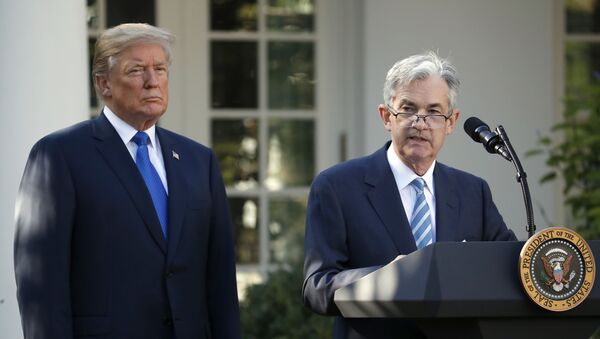Federal Reserve chairman Jerome Powell in a interview aired Sunday on CBS said that the US economy could “easily” shrink by 20-30% due to the pandemic fallout, which might last until late 2021, with a full rebound closely linked to progress in vaccine development.
“The data we'll see for this quarter, which ends in June, will be very, very bad. There'll be a, you know, big decline in economic activity, big increase in unemployment", Powell explained stressing that “what we're really looking at is getting the medical data” - something that “is not what we usually look at, taken care of so that the economic data can start to recover".
Despite giving a gloomy forecast for the current quarter, he expressed a belief that the economy would "recover steadily through the second half of this year", as long as the country could avoid another wave of the insidious coronavirus.
Powell believes the US will certainly cope with the downturn citing its largely healthy financial system, while the COVID-19 healthcare crunch is simply "an outside event" that the American economy will definitely recover from.
He praised a move by Congress to recently green-light new stimulus spending, suggesting it “may be that” the Fed may need to further extend a helping hand, or the Congress “has to do more".
“Congress has done a great deal and done it very quickly. There is no precedent in post-World War II American history that's even close to what Congress has done. And the question is, will it be enough?”
Separately, Powell stressed the importance of preventing a second wave of the epidemic arguing that this “would be quite damaging to the economy and also to public confidence".
As things stand now, he assumed that unemployment could potentially peak at 25%, lamenting that "the lowest paid people", particularly women, were being hurt worst by the downturn.
The US has already green-lit nearly $3 trillion in new stimulus spending, with the Fed also taking radical steps to shore up the economy, pumping trillions of dollars into the financial system. Powell called on US lawmakers to pass more economic stimulus and relief aid.
On Friday, Democrats in the House of Representatives passed an additional $3 trillion coronavirus relief package, days after Powell urged US lawmakers to pass more economic stimulus. However, it is doubted that the new package will pass the Republican-majority Senate, where leader Mitch McConnell has argued there is "no urgency" to double down on issuing relief aid.
In the crisis-hit US, over 36 million citizens have filed for unemployment benefits since mid-March, when the WHO declared the raging coronavirus a pandemic.
The federal government recently issued a set of guidelines, or rather criteria, to be met by states wishing to take the path of easing lockdown measures. Only 14 US states have so far met the most essential federal requirement for reopening, which stipulates a decline in new COVID cases daily for two consecutive weeks, according to Reuters.
The US leads the global tally having so far registered over 1.4 million cases of the new infectious disease, and 89,000 related deaths, according to Johns Hopkins University estimates.


